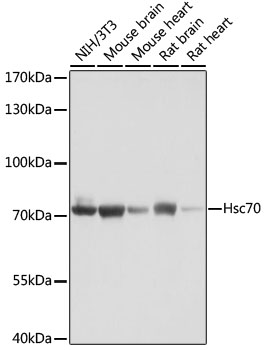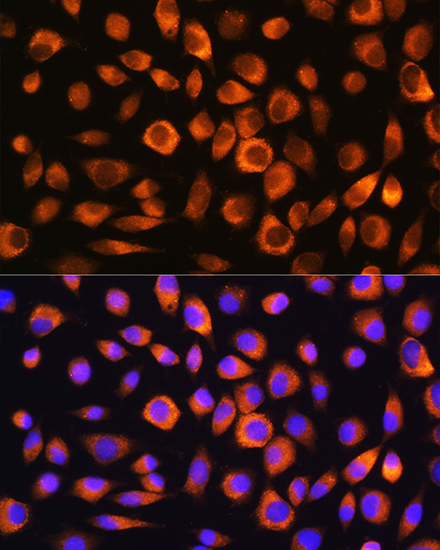Immunology Antibodies 2
Anti-Hsc70 Antibody (CAB2487)
- SKU:
- CAB2487
- Product Type:
- Antibody
- Reactivity:
- Human
- Reactivity:
- Mouse
- Reactivity:
- Rat
- Host Species:
- Rabbit
- Isotype:
- IgG
- Research Area:
- Immunology
Description
| Antibody Name: | Anti-Hsc70 Antibody |
| Antibody SKU: | CAB2487 |
| Antibody Size: | 20uL, 50uL, 100uL |
| Application: | WB IF |
| Reactivity: | Human, Mouse, Rat |
| Host Species: | Rabbit |
| Immunogen: | Recombinant fusion protein containing a sequence corresponding to amino acids 1-300 of human Hsc70 (NP_006588.1). |
| Application: | WB IF |
| Recommended Dilution: | WB 1:500 - 1:2000 IF 1:50 - 1:200 |
| Reactivity: | Human, Mouse, Rat |
| Positive Samples: | NIH/3T3, mouse brain, mouse heart, rat brain, rat heart |
| Immunogen: | Recombinant fusion protein containing a sequence corresponding to amino acids 1-300 of human Hsc70 (NP_006588.1). |
| Purification Method: | Affinity purification |
| Storage Buffer: | Store at -20'C. Avoid freeze / thaw cycles. Buffer: PBS with 0.02% sodium azide, 50% glycerol, pH7.3. |
| Isotype: | IgG |
| Sequence: | MSKG PAVG IDLG TTYS CVGV FQHG KVEI IAND QGNR TTPS YVAF TDTE RLIG DAAK NQVA MNPT NTVF DAKR LIGR RFDD AVVQ SDMK HWPF MVVN DAGR PKVQ VEYK GETK SFYP EEVS SMVL TKMK EIAE AYLG KTVT NAVV TVPA YFND SQRQ ATKD AGTI AGLN VLRI INEP TAAA IAYG LDKK VGAE RNVL IFDL GGGT FDVS ILTI EDGI FEVK STAG DTHL GGED FDNR MVNH FIAE FKRK HKKD ISEN KRAV RRLR TACE RAKR TLSS STQA SIEI DSLY EGID FYTS ITRA |
| Gene ID: | 3312 |
| Uniprot: | P11142 |
| Cellular Location: | Cell membrane, Cytoplasm, Melanosome, Nucleus, nucleolus |
| Calculated MW: | 53kDa/70kDa |
| Observed MW: | 70kDa |
| Synonyms: | HSPA8, HEL-33, HEL-S-72p, HSC54, HSC70, HSC71, HSP71, HSP73, HSPA10, LAP-1, LAP1, NIP71, Hsc70 |
| Background: | This gene encodes a member of the heat shock protein 70 family, which contains both heat-inducible and constitutively expressed members. This protein belongs to the latter group, which are also referred to as heat-shock cognate proteins. It functions as a chaperone, and binds to nascent polypeptides to facilitate correct folding. It also functions as an ATPase in the disassembly of clathrin-coated vesicles during transport of membrane components through the cell. Alternatively spliced transcript variants encoding different isoforms have been found for this gene. |
| UniProt Protein Function: | HSC70: Acts as a repressor of transcriptional activation. Inhibits the transcriptional coactivator activity of CITED1 on Smad-mediated transcription. Chaperone. Isoform 2 may function as an endogenous inhibitory regulator of HSC70 by competing the co- chaperones. Interacts with HSPH1/HSP105. Interacts with IRAK1BP1. Identified in a mRNP granule complex, at least composed of ACTB, ACTN4, DHX9, ERG, HNRNPA1, HNRNPA2B1, HNRNPAB, HNRNPD, HNRNPL, HNRNPR, HNRNPU, HSPA1, HSPA8, IGF2BP1, ILF2, ILF3, NCBP1, NCL, PABPC1, PABPC4, PABPN1, RPLP0, RPS3, RPS3A, RPS4X, RPS8, RPS9, SYNCRIP, TROVE2, YBX1 and untranslated mRNAs. Interacts with PACRG and TSC2. Interacts with BAG1. Interacts with SV40 VP1. Interacts with DNAJC7. Interacts with HERC5. Interacts with CITED1 (via N-terminus); the interaction suppresses the association of CITED1 to p300/CBP and Smad-mediated transcription transactivation. Constitutively synthesized. Ubiquitous. Belongs to the heat shock protein 70 family. 2 isoforms of the human protein are produced by alternative splicing. |
| UniProt Protein Details: | Protein type:RNA-binding; Heat shock protein; Chaperone; Nucleolus Chromosomal Location of Human Ortholog: 11q24.1 Cellular Component: nucleoplasm; spliceosome; extracellular space; focal adhesion; membrane; melanosome; plasma membrane; nucleolus; intracellular; ribonucleoprotein complex; nucleus; cytosol; ubiquitin ligase complex Molecular Function:protein binding; enzyme binding; G-protein-coupled receptor binding; heat shock protein binding; ubiquitin protein ligase binding; ATPase activity; unfolded protein binding; ATPase activity, coupled; ATP binding Biological Process: axon guidance; transcription, DNA-dependent; viral reproduction; protein folding; chaperone cofactor-dependent protein folding; regulation of cell cycle; neurotransmitter secretion; RNA splicing; response to unfolded protein; nuclear mRNA splicing, via spliceosome; positive regulation of nuclear mRNA splicing, via spliceosome; synaptic transmission; protein refolding; gene expression; post-Golgi vesicle-mediated transport; negative regulation of transcription, DNA-dependent |
| NCBI Summary: | This gene encodes a member of the heat shock protein 70 family, which contains both heat-inducible and constitutively expressed members. This protein belongs to the latter group, which are also referred to as heat-shock cognate proteins. It functions as a chaperone, and binds to nascent polypeptides to facilitate correct folding. It also functions as an ATPase in the disassembly of clathrin-coated vesicles during transport of membrane components through the cell. Alternatively spliced transcript variants encoding different isoforms have been found for this gene. [provided by RefSeq, Aug 2011] |
| UniProt Code: | P11142 |
| NCBI GenInfo Identifier: | 123648 |
| NCBI Gene ID: | 3312 |
| NCBI Accession: | P11142.1 |
| UniProt Secondary Accession: | P11142,Q9H3R6, |
| UniProt Related Accession: | P11142 |
| Molecular Weight: | 646 |
| NCBI Full Name: | Heat shock cognate 71 kDa protein |
| NCBI Synonym Full Names: | heat shock 70kDa protein 8 |
| NCBI Official Symbol: | HSPA8 |
| NCBI Official Synonym Symbols: | LAP1; HSC54; HSC70; HSC71; HSP71; HSP73; LAP-1; NIP71; HEL-33; HSPA10; HEL-S-72p |
| NCBI Protein Information: | heat shock cognate 71 kDa protein; LPS-associated protein 1; heat shock 70kd protein 10; epididymis luminal protein 33; heat shock cognate protein 54; constitutive heat shock protein 70; lipopolysaccharide-associated protein 1; N-myristoyltransferase inhibitor protein 71; epididymis secretory sperm binding protein Li 72p |
| UniProt Protein Name: | Heat shock cognate 71 kDa protein |
| UniProt Synonym Protein Names: | Heat shock 70 kDa protein 8; Lipopolysaccharide-associated protein 1; LAP-1; LPS-associated protein 1 |
| UniProt Gene Name: | HSPA8 |
| UniProt Entry Name: | HSP7C_HUMAN |








